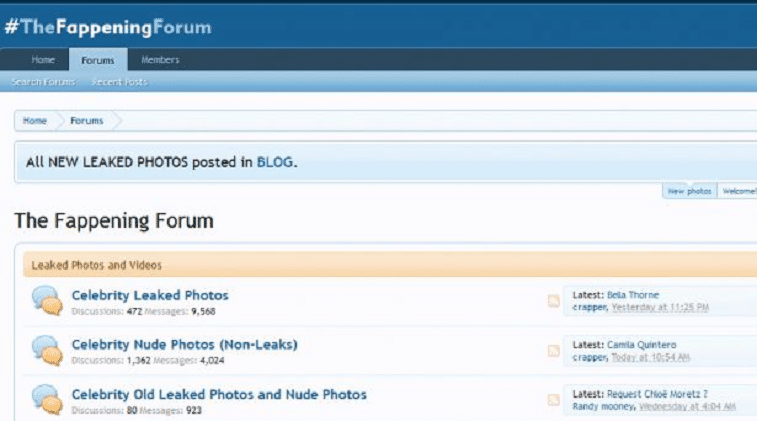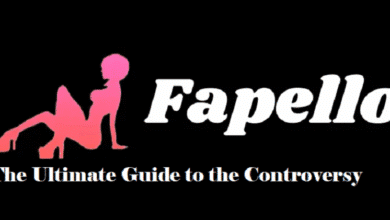Fappening Forum: Anatomy of a Digital Scandal and Its Lingering Legacy

Fappening Forum: In 2014, the world was shocked by an unprecedented breach of privacy that exposed the vulnerability of celebrities to cyberattacks. The scandal, widely known as The Fappening, involved the illegal hacking of celebrity iCloud accounts, leading to the theft and distribution of intimate photos and videos. While the incident was catastrophic for the victims, another key aspect of the scandal was the existence of various online platforms that enabled the distribution of the stolen content. Among these platforms, one name became notorious—The Fappening Forum.
The Fappening Forum became the epicentre of a storm of ethical and legal discussions as users worldwide congregated to share, discuss, and request intimate images of celebrities without their consent. This article will explore the origins, operations, legal ramifications, and lasting impact of The Fappening Forum, along with its role in shaping online privacy discussions and digital rights.
What Was The Fappening Forum?
In August 2014, high-profile celebrity photo leaks occurred, primarily targeting actresses such as Jennifer Lawrence, Kate Upton, and Kirsten Dunst. These images, which were meant to be private, were hacked from their iCloud accounts, a cloud storage service provided by Apple. The leak rapidly spread across the internet and was dubbed “The Fappening,” a term combining “fap” (slang for masturbation) and “happening.”
The scandal exposed the fragility of digital security systems and sparked heated debates around privacy, ethics, and how the media and internet platforms handle such sensitive content. For many celebrities, the breach represented a horrifying violation of their privacy, not just online but in their real lives.
Also Read: What is the Fappening Forum? How It Works Explained in Details
The Rise of The Fappening Forum
While the hacking itself was a criminal act, the role of online platforms, particularly forums, cannot be ignored. The Fappening Forum became a digital gathering spot for people eager to access and discuss the stolen images. The forum, and others like it, were dedicated to sharing these intimate photos without the individuals’ consent. It was a space where users could upload images, request specific content, and discuss the hacked materials.
The Fappening Forum’s existence raised several troubling questions. While it was a community-based platform, it operated in a morally ambiguous space, facilitating the distribution of stolen content that was inherently harmful to its victims. The forum allowed users to remain anonymous, providing security to those engaging in illegal activities. However, this anonymity also made it difficult for authorities to track perpetrators, resulting in widespread legal and ethical challenges.
How The Forum Worked
The Fappening Forum was a typical online community with a user registration system and categorization of content. Users could browse through threads where specific celebrities’ stolen images were being shared, often accompanied by derogatory comments or discussions that belittled the victims. The anonymity allowed users to interact freely, with little fear of retribution.
One of the most controversial aspects of the forum was the accessibility of the content. Because it was not initially hosted on mainstream websites, the images were harder to remove, and the forum quickly gained a reputation for being one of the primary sources for the stolen material. In many cases, the forum featured a continuous stream of new, often unverified, images being shared by users.
Although the platform was meant to cater to a niche group, it found a broad audience. It attracted users from all over the globe, all sharing a common interest in the illicit distribution of personal materials. While the forum’s existence was short-lived, it significantly impacted the trajectory of online privacy discussions and the consequences of digital theft.
The Legal and Ethical Dilemmas
The breach was illegal, as it involved hacking into private accounts and violating several laws, including the Computer Fraud and Abuse Act in the U.S. However, distributing the stolen content on forums like The Fappening Forum raised additional legal questions. Depending on the local laws and regulations surrounding cybercrime and privacy violations, the individuals who shared, requested, or accessed these images may have faced prosecution.
The ethical implications were equally troubling. Sharing personal, intimate images without consent is a violation of privacy that extends far beyond the realm of criminality. It is a betrayal of trust and an assault on the individual’s dignity. The fact that a forum like The Fappening Forum could operate without significant consequences for its users showcased the lack of regulation and oversight that digital spaces often have.
For the victims, the psychological impact was devastating. Many celebrities were forced to speak out publicly, addressing the violation of their privacy and the emotional toll it took on their lives. Some reported receiving online harassment, while others expressed a profound betrayal by those responsible for the leaks. In some cases, the damage to their personal and professional lives was irreversible.
The Fallout: Legal Consequences and Shutdowns
Following the leak, law enforcement agencies, including the FBI, launched investigations into the hacking and distribution of the images. In 2016, Ryan Collins, the man responsible for much of the hacking, was arrested and sentenced to 18 months for his role in the crime. This action warned hackers and online platforms that there were serious consequences for such privacy violations.
However, the legal action did not stop there. Platforms like The Fappening Forum were targeted by authorities for hosting and enabling the distribution of illegal content. Websites hosting stolen content were taken down, and administrators of these sites were pressured into shutting down their operations to avoid prosecution.
Despite these efforts, the damage had been done. The Fappening Forum and similar sites served as a stark reminder of the dark side of the internet, where personal data can be exploited and distributed without consequence. Even though many of these forums were eventually shut down, the legacy of The Fappening continues to have a lasting impact on online privacy, security, and ethics.
The Cultural Impact: A Warning to Celebrities and the Public
The Fappening scandal and the existence of forums like The Fappening Forum contributed to a significant shift in how the public views digital privacy. Celebrities and public figures were forced to confront the realities of online security and how their data could be easily accessed and exploited. This led to broader discussions about the need for stronger privacy protections on digital platforms and more secure data storage methods.
The event also contributed to an ongoing conversation about the ethical responsibilities of online communities. Should platforms be held accountable for the content users post, especially when distributing stolen or harmful materials? Should anonymity be protected if it is used to facilitate illegal activities? These questions remain unanswered and are at the heart of many legal cybercrime debates.
A Shift Towards Better Security and Privacy Protection
In The Fappening’s aftermath, individuals and tech companies began taking stronger measures to protect digital privacy. Apple, for example, increased its focus on securing iCloud accounts by adding two-factor authentication and encryption layers. This was a direct response to the vulnerabilities exposed by the hacking incident.
Moreover, individuals became more aware of the risks of storing sensitive content in the cloud, opting for more secure alternatives or reducing their reliance on digital storage systems altogether. While the increased focus on security is a positive development, it also raises new questions about the future of privacy in the digital age.
The Fappening Forum Legacy
The Fappening Forum may no longer exist, but its legacy continues to shape how we think about privacy in the digital world. It forced society to confront the dangers of unchecked online behaviour and the consequences of allowing such content to be freely disseminated.
From a cultural standpoint, the scandal highlighted the increasing tensions between freedom of expression and the need to protect individuals’ rights to privacy. It also showed how vulnerable personal data can be in an increasingly interconnected world, where the boundaries between public and private spheres are increasingly blurred.
Also Raed: Amber Sym: Bio, Age, Career, Net Worth, Height & More
Conclusion: Moving Beyond The Fappening
The Fappening Forum and the broader scandal it was part of served as a wake-up call for both the tech industry and internet users. As the digital world continues to evolve, we must prioritize privacy and respect for personal boundaries, both online and offline. While the legal system has made strides in holding perpetrators accountable, it is up to society to continue pushing for better protections against cybercrimes and digital exploitation.
For the victims, the scars of The Fappening may never fully heal. Still, their bravery in speaking out against injustice has helped spark a broader conversation about the ethical use of technology and the importance of safeguarding personal privacy in the modern world.
Ultimately, The Fappening was not just a scandal—it was a cultural turning point highlighting the need for responsible online behaviour and a future where digital privacy is taken seriously.
This comprehensive article explores The Fappening Forum’s core issues, from its origins to its cultural, ethical, and legal implications. It highlights the importance of digital security and the ongoing challenges of maintaining privacy in an increasingly connected world.




